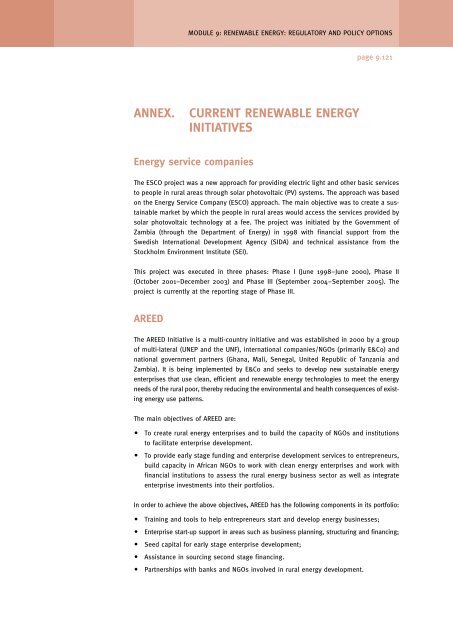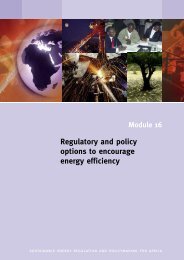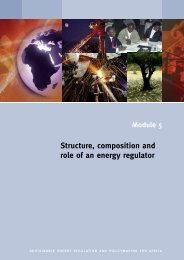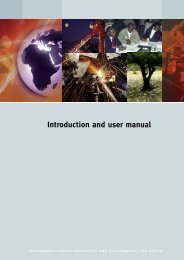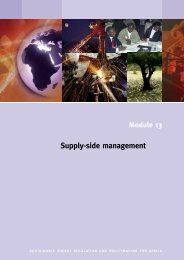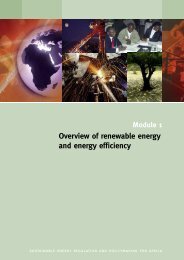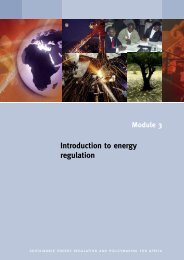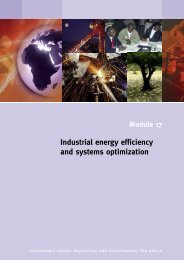Regulatory and policy options to encourage development of ...
Regulatory and policy options to encourage development of ...
Regulatory and policy options to encourage development of ...
- No tags were found...
You also want an ePaper? Increase the reach of your titles
YUMPU automatically turns print PDFs into web optimized ePapers that Google loves.
MODULE 9: RENEWABLE ENERGY: REGULATORY AND POLICY OPTIONSpage 9.121ANNEX.CURRENT RENEWABLE ENERGYINITIATIVESEnergy service companiesThe ESCO project was a new approach for providing electric light <strong>and</strong> other basic services<strong>to</strong> people in rural areas through solar pho<strong>to</strong>voltaic (PV) systems. The approach was basedon the Energy Service Company (ESCO) approach. The main objective was <strong>to</strong> create a sustainablemarket by which the people in rural areas would access the services provided bysolar pho<strong>to</strong>voltaic technology at a fee. The project was initiated by the Government <strong>of</strong>Zambia (through the Department <strong>of</strong> Energy) in 1998 with financial support from theSwedish International Development Agency (SIDA) <strong>and</strong> technical assistance from theS<strong>to</strong>ckholm Environment Institute (SEI).This project was executed in three phases: Phase I (June 1998–June 2000), Phase II(Oc<strong>to</strong>ber 2001–December 2003) <strong>and</strong> Phase III (September 2004–September 2005). Theproject is currently at the reporting stage <strong>of</strong> Phase III.AREEDThe AREED Initiative is a multi-country initiative <strong>and</strong> was established in 2000 by a group<strong>of</strong> multi-lateral (UNEP <strong>and</strong> the UNF), international companies/NGOs (primarily E&Co) <strong>and</strong>national government partners (Ghana, Mali, Senegal, United Republic <strong>of</strong> Tanzania <strong>and</strong>Zambia). It is being implemented by E&Co <strong>and</strong> seeks <strong>to</strong> develop new sustainable energyenterprises that use clean, efficient <strong>and</strong> renewable energy technologies <strong>to</strong> meet the energyneeds <strong>of</strong> the rural poor, thereby reducing the environmental <strong>and</strong> health consequences <strong>of</strong> existingenergy use patterns.The main objectives <strong>of</strong> AREED are:To create rural energy enterprises <strong>and</strong> <strong>to</strong> build the capacity <strong>of</strong> NGOs <strong>and</strong> institutions<strong>to</strong> facilitate enterprise <strong>development</strong>.To provide early stage funding <strong>and</strong> enterprise <strong>development</strong> services <strong>to</strong> entrepreneurs,build capacity in African NGOs <strong>to</strong> work with clean energy enterprises <strong>and</strong> work withfinancial institutions <strong>to</strong> assess the rural energy business sec<strong>to</strong>r as well as integrateenterprise investments in<strong>to</strong> their portfolios.In order <strong>to</strong> achieve the above objectives, AREED has the following components in its portfolio:Training <strong>and</strong> <strong>to</strong>ols <strong>to</strong> help entrepreneurs start <strong>and</strong> develop energy businesses;Enterprise start-up support in areas such as business planning, structuring <strong>and</strong> financing;Seed capital for early stage enterprise <strong>development</strong>;Assistance in sourcing second stage financing.Partnerships with banks <strong>and</strong> NGOs involved in rural energy <strong>development</strong>.


